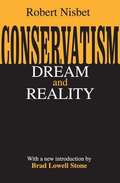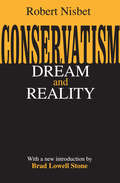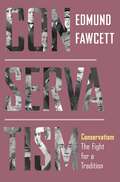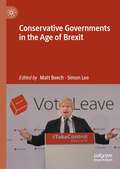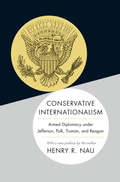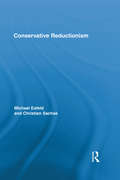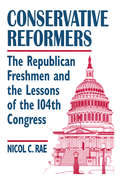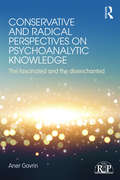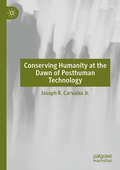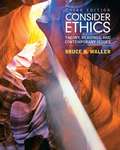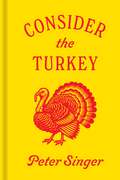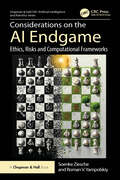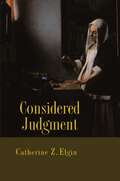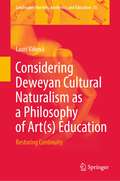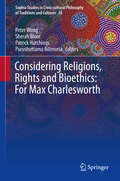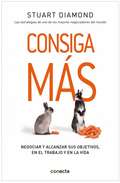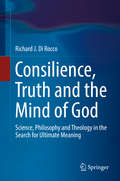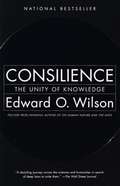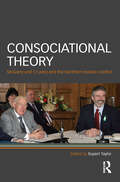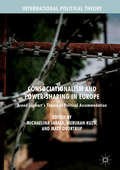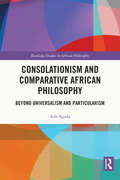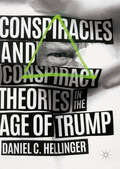- Table View
- List View
Conservatism: Dream and Reality
by Robert NisbetThe essential concerns of conservatism are the same as those that motivated Nisbet's first and most influential book, The Quest for Community. In fact, Conservatism unites virtually all of Nisbet's work. In it, Nisbet deals with the political causes of the manifold forms of alienation that underwrite the human quest for community. The sovereign political state is more than a legal relationship of a superstructure of power, it is inseparable from its successive penetrations of man's economic, religious, kinship and local allegiances, and its revolutionary dislocations of established centers of power. Nisbet holds that although political philosophers are often conceived in terms of their views of the individual and the state, a more useful approach adds the factor of social groups or communities mediating between the individual and the state. Such groups comprise "society" the protection of which is the "sole object" of the conservative tradition, according to Nisbet. This conservative ideology arose in the West as a reaction to the French Revolution and its perceived impact upon traditional society. Edmund Burke was the first spokesman of the new ideology. In this book, Nisbet argues that modern conservatism throughout the West can be seen as a widening of Burke's indictment not only of the French Revolution, but of the larger revolution we have come to call modernity. From Edmund Burke and his contemporaries such as Bonald, de Maistre, Haller, and Savigny, down to T. S. Eliot, Christopher Dawson, Michael Oakeshott, Irving Babbit, Paul Elmer More, and Russell Kirk, the essential themes of political conservatism remained the same. They are centered upon history, tradition, property, authority, liberty and religion, and attack equally the political collectivism and radical individualism that have the same irrational outcomes. Nisbet makes the point that, at present, conservatism is also in a crisis, one created in large measure by mixing in the political arena economic liberalism and welfare state socialism - a lethal mix for conservative politics.
Conservatism: Dream and Reality (Concepts In Social Sciences Ser.)
by Robert NisbetThe essential concerns of conservatism are the same as those that motivated Nisbet's first and most influential book. The Quest for Community. In fact, Conservatism unites virtually all of Nisbet's work. In it, Nisbet deals with the political causes of the manifold forms of alienation that underwrite the human quest for community. The sovereign political state is more than a legal relationship of a superstructure of power, it is inseparable from its successive penetrations of man's economic, religious, kinship and local allegiances, and its revolutionary dislocations of established centers of power. Nisbet holds that although political philosophers are often conceived in terms of their views of the individual and the state, a more useful approach adds the factor of social groups or communities mediating between the individual and the state. Such groups comprise "society" the protection of which is the "sole object" of the conservative tradition, according to Nisbet. This conservative ideology arose in the West as a reaction to the French Revolution and its perceived impact upon traditional society. Edmund Burke was the first spokesman of the new ideology. In this book, Nisbet argues that modern conservatism throughout the West can be seen as a widening of Burke's indictment not only of the French Revolution, but of the larger revolution we have come to call modernity. From Edmund Burke and his contemporaries such as Bonald, de Maistre, Haller, and Savigny, down to T.S. Eliot, Christopher Dawson, Michael Oakeshott, Irving Babbit, Paul Elmer More, and Russell Kirk, the essential themes of political conservatism remained the same. They are centered upon history, tradition, property, authority, liberty and religion, and attack equally the political collectivism and radical individualism that have the same irrational outcomes. Nisbet makes the point that, at present, conservatism is also in a crisis, one created in large measure by mixing in the political arena economic liberalism and welfare state socialism - a lethal mix for conservative politics.
Conservatism: The Fight for a Tradition
by Edmund FawcettA fresh and sharp-eyed history of political conservatism from its nineteenth-century origins to today’s hard RightFor two hundred years, conservatism has defied its reputation as a backward-looking creed by confronting and adapting to liberal modernity. By doing so, the Right has won long periods of power and effectively become the dominant tradition in politics. Yet, despite their success, conservatives have continued to fight with each other about how far to compromise with liberalism and democracy—or which values to defend and how. In Conservatism, Edmund Fawcett provides a gripping account of this conflicted history, clarifies key ideas, and illuminates quarrels within the Right today.Focusing on the United States, Britain, France, and Germany, Fawcett’s vivid narrative covers thinkers and politicians. They include the forerunners James Madison, Edmund Burke, and Joseph de Maistre; early friends and foes of capitalism; defenders of religion; and builders of modern parties, such as William McKinley and Lord Salisbury. The book chronicles the cultural critics and radical disruptors of the 1920s and 1930s, recounts how advocates of laissez-faire economics broke the post 1945 consensus, and describes how Donald Trump, Boris Johnson, and their European counterparts are pushing conservatism toward a nation-first, hard Right.An absorbing, original history of the Right, Conservatism portrays a tradition as much at war with itself as with its opponents.
Conservative Governments in the Age of Brexit
by Simon Lee Matt BeechThis book provides the first evaluation of the three Conservative administrations which have been affected, shaped and largely determined by the age of Brexit.It breaks new ground by collectively analysing the Cameron, May and Johnson administrations in an era of political and social shock and disruption, caused by the phenomenon of Brexit. As an edited collection, the project brings experts together who explain the complexities of ideas, leadership, votes, policy areas and territorial politics in an accessible and concise fashion. As a collection of essays, the project does not prosecute a single thesis, bar the fact that the phenomenon of Brexit has affected, shaped and largely determined the politics of these Conservative administrations and wider UK society. There is broad coverage of leadership, elections, public policy and territorial questions and contributors consider the continuities and discontinuities in Conservative Party ideas and political action in their respective policy areas.
Conservative Internationalism: Armed Diplomacy under Jefferson, Polk, Truman, and Reagan
by Henry R. NauA reexamination of America's overloaded foreign policy tradition and its importance for global politics todayDebates about U.S. foreign policy have revolved around three main traditions—liberal internationalism, realism, and nationalism. In this book, distinguished political scientist Henry Nau delves deeply into a fourth, overlooked foreign policy tradition that he calls "conservative internationalism." This approach spreads freedom, like liberal internationalism; arms diplomacy, like realism; and preserves national sovereignty, like nationalism. It targets a world of limited government or independent "sister republics," not a world of great power concerts or centralized international institutions.Nau explores conservative internationalism in the foreign policies of Thomas Jefferson, James Polk, Harry Truman, and Ronald Reagan. These presidents did more than any others to expand the arc of freedom using a deft combination of force, diplomacy, and compromise. Since Reagan, presidents have swung back and forth among the main traditions, overreaching under Bush and now retrenching under Obama. Nau demonstrates that conservative internationalism offers an alternative way. It pursues freedom but not everywhere, prioritizing situations that border on existing free countries—Turkey, for example, rather than Iraq. It uses lesser force early to influence negotiations rather than greater force later after negotiations fail. And it reaches timely compromises to cash in military leverage and sustain public support.A groundbreaking revival of a neglected foreign policy tradition, Conservative Internationalism shows how the United States can effectively sustain global leadership while respecting the constraints of public will and material resources.
Conservative Reductionism (Routledge Studies in the Philosophy of Science)
by Christian Sachse Michael EsfeldConservative Reductionism sets out a new theory of the relationship between physics and the special sciences within the framework of functionalism. It argues that it is wrong-headed to conceive an opposition between functional and physical properties (or functional and physical descriptions, respectively) and to build an anti-reductionist argument on multiple realization. By contrast, (a) all properties that there are in the world, including the physical ones, are functional properties in the sense of being causal properties, and (b) all true descriptions (laws, theories) that the special sciences propose can in principle be reduced to physical descriptions (laws, theories) by means of functional reduction, despite multiple realization. The book develops arguments for (a) from the metaphysics of properties and the philosophy of physics. These arguments lead to a conservative ontological reductionism. It then develops functional reduction into a fully-fledged, conservative theory reduction by means of introducing functional sub-types that are coextensive with physical types, illustrating that conservative reductionism by means of case studies from biology (notably the relationship between classical and molecular genetics).
Conservative Reformers: The Freshman Republicans in the 104th Congress
by Nicol C. RaeNicol Rae's engaging account of the Republican revolutionaries' freshman year in Congress persuasively demonstrates that the precepts set forth by Madison in Federalist 10 and 51 are still in force in our remarkably stable political system. The 73 Republican freshmen who entered the House of Representatives after the 1994 election were a well-organized group with majority status and a commitment to change. This book examines the extent to which they were successful in redirecting policy and reforming the institutions of representative government -- and the extent to which those same institutions moderated, and even frustrated, efforts to introduce radical, rapid -- indeed revolutionary -- change. Contrasts are drawn both with the role of the Republican freshmen in the Senate and with the power of the President as manifested in the 1995-96 budget battle. The book is based on interviews conducted by the author when he was an APSA Congressional Fellow in the offices of Rep. George P. Radanovich, president of the freshman Republican class, and Sen. Thad Cochran, chairman of the Senate Republican Conference.
Conservative and Radical Perspectives on Psychoanalytic Knowledge: The Fascinated and the Disenchanted (Relational Perspectives Book Series)
by Aner GovrinPsychoanalysis really should not exist today. Until a few years ago, most of the evidence suggested that its time was drawing to a close, and yet psychoanalysis demonstrated remarkable resilience in the face of criticism, alongside significant resurgence over the course of the last years. In "Conservative and Radical Perspectives on Psychoanalytic Knowledge: The Fascinated and the Disenchanted" psychoanalyst and philosopher Aner Govrin describes the mechanisms of sociology within the psychoanalytic community which have enabled it to withstand the hostility levelled at it and to flourish as an intellectual and pragmatic endeavour. He defends the most criticized aspect of psychoanalysis: the fascination of analysts with their theories. Govrin demonstrates that fascination is a common phenomenon in science and shows its role in the evolution of psychoanalysis. Govrin argues that throughout its history, psychoanalysis has successfully embraced an amalgam of what he has defined and termed "fascinated" and "troubled communities." A "fascinated community" is a group that embraces a psychoanalytic theory (such as Bion's, Klein's, Winnicott s) as one embraces truth. A "troubled community" is one that is not satisfied with the state of psychoanalytic knowledge and seeks to generate a fundamental change that does not square with existing traditions (such as new psychoanalytic schools, scientifically troubled communities and the relational approach). It is this amalgam and the continuous tension between these two groups that are responsible for psychoanalysis' rich and varied development and for its ability to adapt to a changing world. Clinical vignettes from the work of Robert Stolorow, Betty Joseph, Antonino Ferro and Michael Eigen illustrate the dynamic by which psychoanalytic knowledge is formed. "Conservative and Radical Perspectives on Psychoanalytic Knowledge" will be of interest to psychoanalysts, psychotherapists and philosophers alike.
Conserving Humanity at the Dawn of Posthuman Technology
by Joseph R. Carvalko Jr.This volume examines the latest scientific and technological developments likely to shape our post-human future. Using a multidisciplinary approach, the author argues that we stand at the precipice of an evolutionary change caused by genetic engineering and anatomically embedded digital and informational technologies. The author delves into current scientific initiatives that will lead to the emergence of super smart individuals with unique creative capacities. He draws on technology, psychology and philosophy to consider humans-as-they-are relative to autonomy, creativity, and their place in a future shared with ‘post humans.’ The author discusses the current state of bioethics and technology law, both which policymakers, beset by a torrent of revolutionary advances in bioengineering, are attempting to steer. Significantly, Carvalko addresses why we must both preserve the narratives that brought us to this moment and continue to express our humanity through, music, art, and literature, to ensure that, as a uniquely creative species, we don’t simply vanish in the ether of an evolution brought about by our own technology.
Consider Ethics: Theory, Readings, and Contemporary Issues
by Bruce N. WallerOffering a balance of theory and applications and a mix of text and readings, Consider Ethics begins with chapters covering ethical theory, each of which is followed by related, classical readings. The book concludes with an examination of six contemporary ethical issues presented in a pro/con format with introductory material that places each issue in context. Featuring selections from the world's most influential philosophers, this combination of primary texts and explanatory pedagogy presents the material in a clear, accessible way that does not sacrifice rigor. Making connections among different ethical theories throughout, the text helps students to engage the subject matter and apply theories to important contemporary ethical issues.
Consider the Lilies
by Alfreda Oko Martin Edward MartinJapanese flower arranging has attracted a world wide following, and this book is a simple and clear introduction to the art.The first section illustrates thirty-six suggested flower arrangements with diagrams and full how-to-do-it instructions. The second part of the book explains the theory and technique of Japanese flower arrangement. The result is a book which gives an astonishing range of flower arrangements, clear explanations of how to make them at home, and an inspiring selection of devotional passages.
Consider the Turkey
by Peter SingerWhy this holiday season is a great time to rethink the traditional turkey feastA turkey is the centerpiece of countless Thanksgiving and Christmas dinners. Yet most of us know almost nothing about today&’s specially bred, commercially produced birds. In this brief book, bestselling author Peter Singer tells their story—and, unfortunately, it&’s not a happy one. Along the way, he also offers a brief history of the turkey and its consumption, ridicules the annual U.S. presidential &“pardon&” of a Thanksgiving turkey, and introduces us to &“a tremendously handsome, outgoing, and intelligent turkey&” named Cornelius. Above all, Singer explains how we can improve our holiday tables—for turkeys, people, and the planet—by liberating ourselves from the traditional turkey feast. In its place, he encourages us to consider trying a vegetarian alternative—or just serving the side dishes that many people already enjoy far more than turkey. Complete with some delicious recipes for turkey-free holiday feasting, Consider the Turkey will make you reconsider what you serve for your next holiday meal—or even tomorrow&’s dinner.
Considerations on the AI Endgame: Ethics, Risks and Computational Frameworks (Chapman & Hall/CRC Artificial Intelligence and Robotics Series)
by Soenke Ziesche Roman V. YampolskiyThis seminal volume offers an interdisciplinary exploration into the rapidly evolving field of artificial intelligence and its societal implications. Written by leading scholars Soenke Ziesche and Roman V. Yampolskiy, the book delves into a multitude of topics that address the rapid technological advancements in AI and the ethical dilemmas that arise as a result.The topics explored range from an in-depth look at AI welfare science and policy frameworks to the mathematical underpinnings of machine intelligence. These subjects include discussions on preserving our personal identity in technological contexts as well as on the question of AI identity, innovative proposals towards the critical AI value alignment problem and a call to merge Western and non-Western approaches towards universal AI ethics. The work also introduces unconventional yet crucial angles, such as the concept of "ikigai" in AI ethics and a pioneering attempt to map a potential AI-driven ikigai universe as well as the role of design formalisation, or "Designometry," in the creation of artefacts.By offering a balanced mix of theoretical and applied insights, the book serves as an invaluable resource for researchers, policymakers and anyone interested in the future of AI and the extent of its impact on society.
Considered Judgment
by Catherine Z. ElginPhilosophy long sought to set knowledge on a firm foundation, through derivation of indubitable truths by infallible rules. For want of such truths and rules, the enterprise foundered. Nevertheless, foundationalism's heirs continue their forbears' quest, seeking security against epistemic misfortune, while their detractors typically espouse unbridled coherentism or facile relativism. Maintaining that neither stance is tenable, Catherine Elgin devises a via media between the absolute and the arbitrary, reconceiving the nature, goals, and methods of epistemology. In Considered Judgment, she argues for a reconception that takes reflective equilibrium as the standard of rational acceptability. A system of thought is in reflective equilibrium when its components are reasonable in light of one another, and the account they comprise is reasonable in light of our antecedent convictions about the subject it concerns. Many epistemologists now concede that certainty is a chimerical goal. But they continue to accept the traditional conception of epistemology's problematic. Elgin suggests that in abandoning the quest for certainty we gain opportunities for a broader epistemological purview--one that comprehends the arts and does justice to the sciences. She contends that metaphor, fiction, emotion, and exemplification often advance understanding in science as well as in art. The range of epistemology is broader and more variegated than is usually recognized. Tenable systems of thought are neither absolute nor arbitrary. Although they afford no guarantees, they are good in the way of belief.
Considering Deweyan Cultural Naturalism as a Philosophy of Art: Restoring Continuity (Landscapes: the Arts, Aesthetics, and Education #35)
by Lauri VäkeväThis book makes a case for cultural naturalism as a basis for a philosophy of art education. It argues for a holistic approach that avoids hard boundaries between artistic disciplines in the educational context, applying cultural naturalism to challenges that are topical for the whole art(s) education field, including challenges related to ecology, social justice, and technological transformation of culture. The book is written in the form of a conditional argument that considers the consequences of cultural naturalism for today’s philosophical problem-solving in art(s) education. It contains a systematic and historical analysis of cultural naturalism that support the philosophical reflection of educators and other scholars operative in this field. The result is a late modern reading of Deweyan cultural naturalism that highlights the continuance of key philosophical ideas from the modern to present discourses. The key topics discussed are of particular interest to present-day art(s) educators: ecological sustainability, social justice, and technological transformation of culture. In addition, this book provides an example of pragmatist argumentation, suggesting an alternative to analytical and post-philosophical approaches.
Considering Religions, Rights and Bioethics: Memorial Volume For Max Charlesworth (Sophia Studies in Cross-cultural Philosophy of Traditions and Cultures #30)
by Peter Wong Purushottama Bilimoria Sherah Bloor Patrick HutchingsThis volume engages in conversation with the thinking and work of Max Charlesworth as well as the many questions, tasks and challenges in academic and public life that he posed. It addresses philosophical, religious and cultural issues, ranging from bioethics to Australian Songlines, and from consultation in a liberal society to intentionality. The volume honours Max Charlesworth, a renowned and celebrated Australian public intellectual, who founded the journal Sophia, and trained a number of the present heirs to both Sophia and academic disciplines as they were further developed and enhanced in Australia: Indigenous Australian studies, philosophy of religion, the study of the tension between tradition and modernity, phenomenology and existentialism, hermeneutics, feminist philosophy, and philosophy of science that is responsive to environmental issues.
Consiga más
by Diamond StuartLa negociación es parte de toda relación, y la mayoría no lo hacemos bien. En lugar de obsesionarse con el ganar-ganar, en ocasiones es más rentable perder hoy para ganar mañana. Stuart Diamond sostiene que el uso del poder puede ser perjudicial porque provoca represalias, daña las relaciones y afecta a la credibilidad. Levantarse de la mesa nunca es más aconsejable que tratar de comprender el punto de vista de la otra persona e intentar darle una salida. El dinero no lo determina todo; existen intangibles como el aprecio por el otro, que pueden aportar una enorme rentabilidad. Basado en un famoso curso que el autor lleva años impartiendo, Consiga más proporciona unas estrategias prácticas para cualquier situación, tanto en la vida privada como en el trabajo.
Consilience, Truth and the Mind of God: Science, Philosophy and Theology in the Search for Ultimate Meaning
by Richard J. Di RoccoThis book argues that God can be found within the edifice of the scientific understanding of physics, cosmology, biology and philosophy. It is a rewarding read that asks the Big Questions which humans have pondered since the dawn of the modern human mind, including: Why and how does the universe exist? From where do the laws of physics come? How did life and mind arise from inanimate matter on Earth? Science and religion have a common interest in the answers to such questions, yet many scientists and believers have been at odds for centuries. The author and contributors present a program for moving beyond the vastly different perspectives of reality offered by science and religion. Historical proofs for the existence of God are considered in light of the possibility that the universe may be only one in an eternal multiverse that contains an infinite number of other universes. Readers will find a modification of St. Augustine’s Argument from Truth for the existence of the necessary, self-sufficient being commonly referred to as God. This book is suited to all with an interest in the crossing points of science and religion, providing much food for thought and reflection. If in the end, you cannot accede to philosophy’s proofs, or theism’s invitation to faith, perhaps you will nevertheless say ‘yes’ to the amazing universe in which we live.
Consilience, Truth and the Mind of God: Science, Philosophy and Theology in the Search for Ultimate Meaning
by Richard J. Di RoccoThis book argues that God can be found within the edifice of the scientific understanding of physics, cosmology, biology and philosophy. It is a rewarding read that asks the Big Questions which humans have pondered since the dawn of the modern human mind, including: Why and how does the universe exist? From where do the laws of physics come? How did life and mind arise from inanimate matter on Earth? Science and religion have a common interest in the answers to such questions, yet many scientists and believers have been at odds for centuries. The author and contributors present a program for moving beyond the vastly different perspectives of reality offered by science and religion. Historical proofs for the existence of God are considered in light of the possibility that the universe may be only one in an eternal multiverse that contains an infinite number of other universes. Readers will find a modification of St. Augustine’s Argument from Truth for the existence of the necessary, self-sufficient being commonly referred to as God. This book is suited to all with an interest in the crossing points of science and religion, providing much food for thought and reflection. If in the end, you cannot accede to philosophy’s proofs, or theism’s invitation to faith, perhaps you will nevertheless say ‘yes’ to the amazing universe in which we live.
Consilience: The Unity of Knowledge
by Edward O. WilsonAuthor that behind disciplines as diverse as physics, biology, anthropology and the arts, lies a small number of natural laws, whose interlocking he calls consilience.
Consociational Theory: McGarry and O’Leary and the Northern Ireland conflict (Routledge Research in Comparative Politics)
by Rupert TaylorConsociational power sharing is increasingly gaining ground, right around the world, as a means for resolving political conflict in divided societies. In this volume, edited by Rupert Taylor, nineteen internationally-respected scholars engage in a lively debate about the merits of the theory underlying this approach. The volume focuses specifically on one of the leading cases under the global spotlight, the Northern Ireland conflict, and brings together the most prominent proponents and opponents of consociationalism. Northern Ireland’s transition from war to peace is seen by consociationalists as flowing from the historic Belfast Agreement of 1998, and specifically from the Agreement’s consociational framework. The Northern Ireland case is marketed by consociationalists as representing best practice, and as providing a template for ending conflicts in other parts of the world. However, as this volume interrogates, on what grounds, and to what extent, can such a positive reading be upheld? Taken as a whole, this volume, structured as a symposium around the highly-influential argument of John McGarry and Brendan O’Leary, offers comparative, engaging, and critical insight into how political theory can contribute to the creation of a better world. Consociational Theory is an important text for anyone with an interest in political theory, conflict resolution in divided societies, or Irish politics.
Consociationalism and Power-Sharing in Europe: Arend Lijphart’s Theory of Political Accommodation (International Political Theory)
by Matt Qvortrup Michaelina Jakala Durukan KuzuThis book examines the theoretical and practical relevance and challenges of the consociationalist model of democracy. Since the publication of the Politics of Accommodation (1968) and Democracy in Plural Societies (1977) Professor Lijphart's theories and practical implementations have played a key role in establishing enduring peace settlements. In this edited volume, scholars and Professor Lijphart himself critically examine the history of consocationalism and its application in areas including Northern Ireland, Bosnia-Herzegovina, and Colombia. The book will be essential reading for undergraduate and graduate students of political science, comparative politics, transitional justice and peace studies. It will also be of use to practitioners ranging from diplomats to NGOs who are interested in the practical application of tested models of political accommodation.
Consolation Of Philosophy (Hackett Classics Ser.)
by Boethius Joel C. RelihanEntirely faithful to Boethius' Latin; Relihan's translation makes the philosophy of the Consolation intelligible to readers; it gives equal weight to the poetry--in fact, Relihan's metrical translation of Boethius' metro are themselves contributions of the first moment to Boethian studies. Boethius finally has a translator equal to his prodigious talents and his manifold vision.
Consolationism and Comparative African Philosophy: Beyond Universalism and Particularism (Routledge Studies in African Philosophy)
by Ada AgadaIn a major challenge to African philosophy, this book demonstrates the importance of the universalisation question for every committed African philosopher. Rooted in Africa’s colonial legacy, the universalisation question challenges the African thinker to show how authentically African philosophical concepts and phenomena can be universally applicable in a globalising world. In this highly original book, the author inserts the philosophy of consolationism into African philosophical discourse, constructing a unique philosophical system that is at once African and universally relevant. The book engages major African and Western philosophers of diverse ideological leanings in a compelling dialogue that announces the future of world philosophy as one of interculturality, in which a common philosophical horizon is forged out of the cultural diversities of the world for the edification of humanity in a continually changing world. This book will be an important read for researchers in the fields of African Studies, intercultural philosophy, philosophy of mind, and existentialism.
Conspiracies and Conspiracy Theories in the Age of Trump
by Daniel C. HellingerThis book focuses on the constant tension between democracy and conspiratorial behavior in the new global order. It addresses the prevalence of conspiracy theories in the phenomenon of Donald Trump and Trumpism, and the paranoid style of American politics that existed long before, first identified with Richard Hofstadter. Hellinger looks critically at both those who hold conspiracy theory beliefs and those who rush to dismiss them. Hellinger argues that we need to acknowledge that the exercise of power by elites is very often conspiratorial and invites both realistic and outlandish conspiracy theories. How we parse the realistic from the outlandish demands more attention than typically accorded in academia and journalism. Tensions between global hegemony and democratic legitimacy become visible in populist theories of conspiracy, both on the left and the right. He argues that we do not live in an age in which conspiracy theories are more profligate, but that we do live in an age in which they offer a more profound challenge to the constituted state than ever before.
